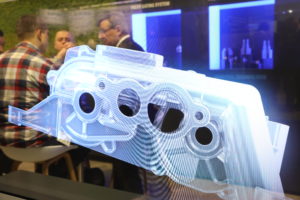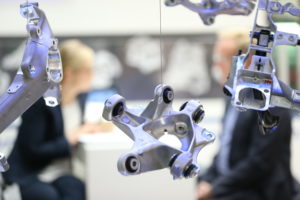Die casting is an economic method for the manufacture of structural components. The foundries that operate in this area have to cope with a number of challenges. The use of modern manufacturing technology and the cooperation with other companies in the value chain strengthen their competitiveness. Structural components made by light metal die casting, above all aluminium and magnesium, are an integral part of modern automotive bodies and chassis. These components can be reliably manufactured with die casting methods, meet important requirements in terms of lightweight construction, strength and crash behaviour and can be completely recycled at the end of their useful life [1].
Market development
Specialists expect that the market for structural castings will continue to grow strongly in the coming years [2]. The general global demand for automotive die castings is expected to increase from more than USD 7.5 billion in 2015 to nearly USD 12 billion in 2021 with an estimated average annual growth rate (CAGR) of more than 7.8% in the period from 2016 to 2021 [3]. One of the strengths of die casting technology is that die casting processes enable in one operation step the manufacture of parts which can combine different geometries, partially reinforced or thinned wall thicknesses and various functions.
Challenges
The most important requirement of automobile manufacturers to their suppliers is to deliver reliably parts with a consistently high quality on a just-in-time basis. Additionally, automobile manufacturers expect their suppliers to operate own manufacturing facilities near the car factories. In order to be able to fulfill this requirement, die casting foundries must cope with many challenges which influence each other. Last but not least, this includes globalization. The global interlinking of industrial activities means that well-established automotive suppliers have to cope with a strong international competition where also companies from emerging economies are going to play a more active role. As structural components usually have a large surface and a small thickness, light metal die casting is competing in this field with the processing of steel and aluminum sheets and profiles. This presents another challenge for die casting foundries [4].
Possible solutions

In order to meet the requirements of the automobile industry and other customers, the cost-efficient manufacture of the cast structural components along the entire value chain is of crucial importance. Modern manufacturing systems guarantee high availability, work in an energy and raw material-efficient manner and can be flexibly adapted to new market and order situations. By using these systems, die casting foundries can use considerable saving potentials and thus strengthen their competitiveness [5]. Therefore, constant and meaningful investments are necessary to keep the production facility up to date. Lasting cooperations with suppliers and customers also help to make the necessary investments and to develop solutions which offer added value to the customers. The topic of “digitization” (Industry 4.0) is also of growing importance because processes can be controlled more efficiently by digital methods and optimization potentials can be identified at an early stage. The recorded machine and production data provide information about the condition of the production facilities, visualize the optimization potential and can be clearly and comprehensively documented, which is becoming increasingly important with regard to liability issues. And last but not least, it is the ability to recognize market and customer needs early on and to provide solutions as well as to ensure a comprehensive, customer-focused service which help die casting foundries to exist in a global market [6].
Large companies oft the die casting industry such as Dynacast, Martinrea Honsel or Nemak have established branches in countries such as China and Mexico to supply directly the local OEM factories of their customers. In these markets especially German companies, which have a high level of technological know-how, are offered still good opportunities in order to survive in the global competition. The EUROGUSS die casting exhibitions outside Europe in China, India, Thailand and Mexico are an ideal forum for these companies to present themselves and their skills and establish contacts.
Good market opportunities
The automobile industry is undergoing a period of transition in terms of drive technology. Nobody knows where this change will end. However, it seems already clear that suppliers which manufacture only components for combustion engines and conventional powertrains will lose market segments. On the other hand, vehicles with hybrid, electric, fuel-cell or other “alternative” drives require special components, such as battery housings, which can be optimally manufactured by die casting. Vehicles with hybrid drive need also a weight compensation because they have two drive systems. Also for this purpose, die castings are very suitable. Last but not least, as every motor vehicle irrespective of its drive requires structural parts, there are good market opportunities for die casting foundries in this field also in the future.




